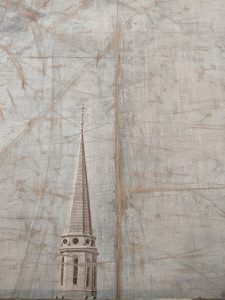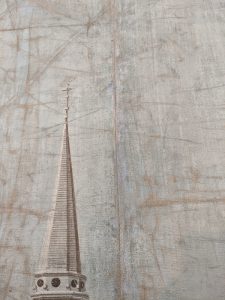Rhode Island Historical Society Presents Restoration to Oldest American Theater Scenery
Oldest American Theater Scenery at the RIHS 198th Annual Meeting
Wednesday, November 13th, 5:30 p.m.
The Rhode Island Historical Society (110 Benevolent Street, Providence, RI)
Rhode Island Historical Society Presents Restoration to Oldest American Theater Scenery

BEFORE
The Rhode Island Historical Society will celebrate the recent restoration of an early, massive view of Providence, painted on a theater drop-curtain over 200 years ago, at their 198th Annual Meeting. Painted in 1809, the curtain is the oldest surviving piece of American theater scenery, and depicts a sweeping view of Providence’s East Side and Downtown areas from Smith Hill. The entire image is 15 feet wide and stands at 24 feet tall.

AFTER
The first conservation and stabilization treatments on the drop-scene occurred in the early 1980s and were performed by the Williamstown Conservation Center with the support of the National Endowment for the Arts. Critical support for the present project came from Sylvia Brown, a descendant of the man who made the theater possible in the 18th century. Curtains Without Borders, a Vermont-based firm which specializes in the conservation of historic painted theater scenery, performed the work in July. Their team of three conservators removed 30 years of dust and applied judicious in-painting until they felt there was an overall improvement that was not intrusive to the eye. They concentrated on the vertical seams and long diagonal scratches, with some clarification of the lower steps and balcony to improve the view of the cityscape.
The team also repaired minor rips and tears with appropriate support materials. Due to the incalculable historical importance of this artifact, it was agreed to limit the amount of painting restoration performed–prioritizing the longevity of the material itself over a dramatic replication of how the image looked the day it was completed. “Though we have been looking into a digital restoration to demonstrate the original scene’s quality” said Richard Ring, Deputy Executive Director for Collections & Interpretation.
In the 1750s and 60s, when the suppression of theatrical entertainments was a political and moral issue in New England (as Puritan strongholds), theater companies generally limited themselves to the mid-Atlantic and southern states, and the West Indies (where English theater was born in the Americas). Newport was the “first place in New England in which a temple of the muses was raised.” In September of 1761 the play The Provoked Wife; or, a Journey to London, was the first dramatic performance given in New England by a regular company of professional actors. After a few performances in Newport, the company came to Providence and performed in a barn-like structure on Meeting Street east of Benefit Street, but without the town’s permission; this sparked a large enough reaction to engender and pass a law in the General Assembly forbidding performances, and effectively ended theater in New England until after the Revolution.
In the early 1790s, Boston was still resistant, but the people of Rhode Island were more receptive, and after many meetings, discussions, and some persuasive marketing, it was agreed to allow a permanent theater to be established in Providence. John Brown gave the lot (the corner of Westminster and Mathewson streets, where Grace Church now stands), and subscribed for seven shares of stock in the company. Construction on the building began August 6, 1795, and it measured 81 x 50 feet, fronting on Westminster Street. The proscenium was 16 x 24 feet, and over the arch was a scroll bearing the motto: “Pleasure the means; the end virtue.”
“Most of our members will be surprised to know that there is a scene on the back! The work done allowed us to take pictures of it. We are not sure if it was painted by Worrall, but there is speculation in our archive of correspondence about what play this scene illustrated—a good question for a theater major!” said Richard Ring. “We’re just excited that the preservation of this American treasure demonstrates Rhode Island’s performing arts legacy and is a great way to gear up for our 2020 theme of ‘Spotlight RI’.”
The Historical Society will celebrate the preservation of work during Annual Meeting for RIHS members. Membership registration information can be found on their website at https://www.rihs.org/join/ .
Those who are not members of the Rhode Island Historical Society but hoping to see the restoration first hand are invited to 110 Benevolent Street Thursday, November 14th, between 1 – 5 p.m.